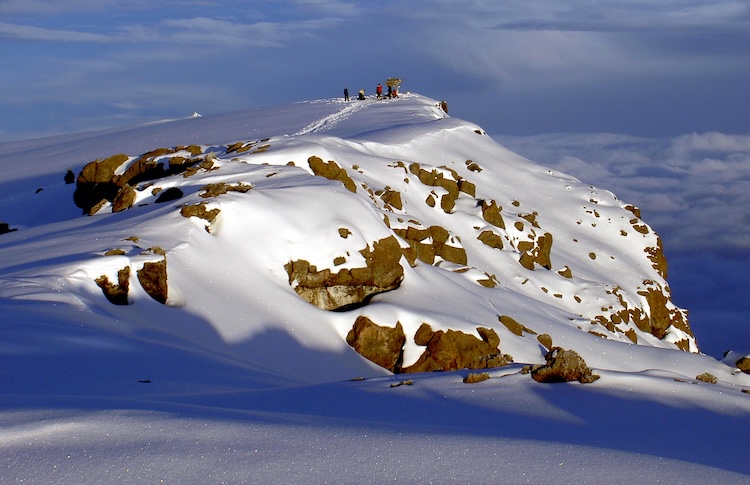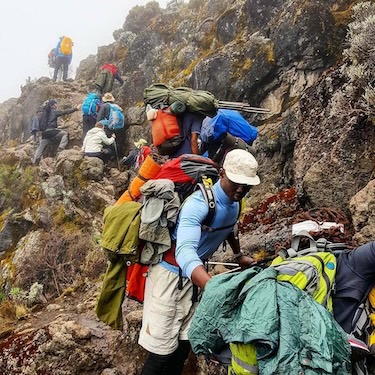By Kizito Makoye
MOSHI, Tanzania | 23 August 2024 (IDN) — Juma Abdallah, a 34-year-old porter from Kiraracha village on the southern slopes of Mount Kilimanjaro, trudges along the steep, rocky trails of the mountain, his breath visible in the thin, chilly air.
The weight of the load on his back—a cumbersome mix of tents, cooking supplies, and a climber’s personal belongings—bears down on him. Yet, he keeps moving, driven by survival instinct and the thought of his family waiting for him at home.
“I’ve been doing this job for over a decade,” Abdallah says, adjusting the strap of his worn-out backpack. “Every step I take, every move I make, I think of my children and the hope that one day they won’t have to carry loads up this mountain to make ends meet.”
These unsung heroes play a crucial role in ensuring climbers reach the summit. But now, their jobs are under threat, and the blame is being pointed squarely at the Kilimanjaro Porters Assistance Project (KPAP), a foreign-affiliated initiative that local operators claim is sabotaging their businesses.
Edson Mpemba, a leader of Tanzania’s porters, is frustrated as his people lose jobs at an alarming rate. “I’ve been spending sleepless nights trying to figure out why jobs on Mount Kilimanjaro are declining and what we can do to save my helpless porters,” Mpemba said at a recent press conference in Moshi.
Mpemba believes that local tour companies, which have traditionally hired nearly 250,000 porters annually, are losing business due to a mudslinging campaign led by KPAP. According to him, KPAP’s efforts to label non-partner companies as “irresponsible” are costing local operators their foreign clients.

“The foreign travel agents have stopped selling packages from local companies because of this campaign,” Mpemba explained. “Since local tour operators are losing business, we porters are bearing the brunt of it, directly losing our jobs.”
The situation is dire. If the trend continues, Mpemba warns, local operators could go out of business entirely, leaving thousands of porters, guides, and cooks without work.
Kilimanjaro, the world’s tallest free-standing mountain at 5,895 meters (19,341 feet) above sea level, is a major draw for tourists from around the globe. However, ensuring that the dollars spent by international tourists benefit the poor communities living near tourist destinations has long been a challenge worldwide.
A study by SNV, titled ‘Tracing the Tourist Dollar in Northern Tanzania,’ reveals that climbing Mount Kilimanjaro is more beneficial to the poor than other tourist activities in the region. The study shows that 28 percent of the revenue generated from climbing Africa’s highest peak trickles down to poor communities, compared to just 19 percent from other attractions in the northern tourist circuit.
With 56,000 tourists climbing Kilimanjaro each year, generating $50 million in revenue, approximately $14 million of this amount goes directly into the pockets of the impoverished locals who rely on trekking for their livelihoods. Wages and tips earned by climbing staff, many of whom come from poor backgrounds, are considered 100 percent pro-poor.
This model of resource transfer from international tourists to local communities is seen as one of the most effective in Africa and Asia. Tourism remains a cornerstone of Tanzania’s economy, contributing 19 percent to the country’s gross domestic product and 25 percent of all foreign exchange revenues. In 2018 alone, the sector provided direct employment to more than 600,000 people and generated approximately $2.4 billion, according to government statistics.
Yona Samwel, a local tour operator from Almighty Kilimanjaro Ltd, echoed these concerns. He argues that KPAP’s influence is detrimental to the industry. “KPAP has been spreading the word that non-partner tour companies are irresponsible, causing us to lose market share abroad,” Samwel said. “We’re now at a point where travel agents demand we partner with KPAP just to get business. This is fundamentally wrong.”
The problem, Samwel says, lies in KPAP’s arbitrary vetting process. The organization has listed only 150 tour companies on its website as “responsible,” of which 105 are foreign. This leaves the majority of local operators excluded and struggling to survive.

“What gives KPAP the authority to vet foreign companies operating on Mount Kilimanjaro?” Samwel asked. “This is a clear violation of Tanzania’s Tourism Act, which reserves mountain climbing operations for local companies.”
The law is unambiguous—only Tanzanian citizens are permitted to engage in mountain climbing or trekking business on Kilimanjaro. Yet, KPAP’s actions seem to disregard this, undermining local operators and the legal framework meant to protect them.
Samwel urged the government to intervene before it’s too late. “If local tour companies are pushed out of business, thousands of porters, guides, and cooks will be left jobless,” he warned.
Tanzania Porters Organization (TPO) Executive Secretary, Loshiye Mollel, also criticized KPAP, accusing the organization of overstepping its mandate.
“Dictating that all tour operators must partner with KPAP will spoil the tourism business,” Mollel said. “KPAP is a project, not an authority. It doesn’t have members, so it cannot claim to solely support the interests of porters.”
Mollel fears that KPAP could eventually monopolize the industry if the government doesn’t take swift action. “The KPAP attempt to assume the role of a tourism business licensing authority in Tanzania doesn’t bode well for the industry,” he added.
Local operators and porter associations in Kilimanjaro are now calling on the government to step in and stop the damage being done to Tanzania’s tourism industry. They accuse KPAP of crossing the line from advocacy into unwarranted interference, which has led to a loss of business and jobs.
Some American and European travel agencies have already begun denying local operators tourists due to KPAP’s controversial online campaign, which claims that non-partner companies are untrustworthy and mistreat porters.
“KPAP should stop portraying non-partners as irresponsible companies,” said Gasper Meela, an irate tour operator in Kilimanjaro. “As an NGO, it has no authority to monitor or vet tour operators in this region.”
In response, Kelvin Salla, Chief Executive Officer of Kilimanjaro Responsible Trekking Organisation (KRTO), which oversees KPAP, defended the organization’s actions. “We only support tour companies that want to be certified as responsible,” Salla said, emphasizing that the certification process is voluntary.
However, for many local operators, KPAP’s influence feels more like coercion than support. And as the conflict continues, it’s the porters like Juma Abdallah who are left carrying the heaviest burden. [IDN-InDepthNews]
Photo: Juma Abdallah, a 34-year-old porter from Kiraracha village on the southern slopes of Mount Kilimanjaro. Credit: Zuberi Mussa.


